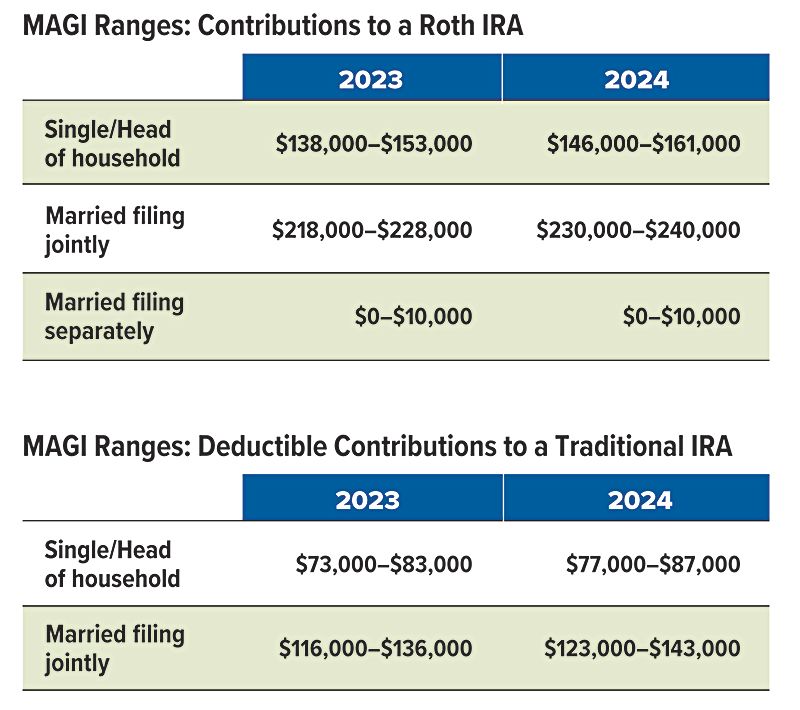Key Retirement and Tax Numbers for 2024
Every year, the Internal Revenue Service announces cost-of-living adjustments that affect contribution limits for retirement plans and various tax deduction, exclusion, exemption, and threshold amounts.
Here are a few of the key adjustments for 2024.
Estate, gift, and generation-skipping transfer tax
- The annual gift tax exclusion (and annual generation-skipping transfer tax exclusion) for 2024 is $18,000, up from $17,000 in 2023.
- The gift and estate tax basic exclusion amount (and generation-skipping transfer tax exemption) for 2024 is $13,610,000, up from $12,920,000 in 2023.
Standard deduction
A taxpayer can generally choose to itemize certain deductions or claim a standard deduction on the federal income tax return. In 2024, the standard deduction is:
- $14,600 (up from $13,850 in 2023) for single filers or married individuals filing separate returns
- $29,200 (up from $27,700 in 2023) for married joint filers
- $21,900 (up from $20,800 in 2023) for heads of households
The additional standard deduction amount for the blind and those age 65 or older in 2024 is:
- $1,950 (up from $1,850 in 2023) for single filers and heads of households
- $1,550 (up from $1,500 in 2023) for all other filing statuses
Special rules apply for an individual who can be claimed as a dependent by another taxpayer.
IRAs
The combined annual limit on contributions to traditional and Roth IRAs is $7,000 in 2024 (up from $6,500 in 2023), with individuals age 50 or older able to contribute an additional $1,000. The limit on contributions to a Roth IRA phases out for certain modified adjusted gross income (MAGI) ranges (see table). For individuals who are active participants in an employer-sponsored retirement plan, the deduction for contributions to a traditional IRA also phases out for certain MAGI ranges (see table). The limit on nondeductible contributions to a traditional IRA is not subject to phaseout based on MAGI.
Employer-sponsored retirement plans
- Employees who participate in 401(k), 403(b), and most 457 plans can defer up to $23,000 in compensation in 2024 (up from $22,500 in 2023); employees age 50 or older can defer up to an additional $7,500 in 2024 (the same as in 2023).
- Employees participating in a SIMPLE retirement plan can defer up to $16,000 in 2024 (up from $15,500 in 2023), and employees age 50 or older can defer up to an additional $3,500 in 2024 (the same as in 2023).
Kiddie tax: child's unearned income
Under the kiddie tax, a child's unearned income above $2,600 in 2024 (up from $2,500 in 2023) is taxed using the parents' tax rates.
All Securities Through Money Concepts Capital Corp., Member FINRA / SIPC
11440 North Jog Road, Palm Beach Gardens, FL 33418 Phone: 561.472.2000
Copyright 2010 Money Concepts International Inc.
Investments are not FDIC or NCUA Insured
May Lose Value - No Bank or Credit Union Guarantee
This communication is strictly intended for individuals residing in the state(s) of MI. No offers may be made or accepted from any resident outside the specific states referenced.
Prepared by Broadridge Advisor Solutions Copyright 2020.
Contact Info
Address:
9426 Spring Creek Ct
Middleville, MI 49333
Phone:
Fax :
269.795.3420
Hours:
January
Mon - Fri 9am - 5pm
Sat & Sun Closed
February - April 15 (Tax Season)
Mon - Fri 9am - 6pm
Sat 9am - 1pm
Sun Closed
April 16 - December 31
Tue - Thur 9am - 5pm
Other times by appointment
Contact Info
Address:
9426 Spring Creek Ct
Middleville, MI 49333
Phone:
Fax :
269.795.3420
Hours:
January
Mon - Fri 9am - 5pm
Sat & Sun Closed
February - April 15 (Tax Season)
Mon - Fri 9am - 6pm
Sat 9am - 1pm
Sun Closed
April 16 - December 31
Tue - Thur 9am - 5pm
Other times by appointment
All Rights Reserved | Thornapple Financial Center













